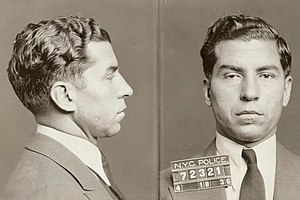Charles "Lucky" Luciano A Fake Mobster?
Author Tim Newark claims reputation of father of organised crime was heavily inflated
The American gangster who inspired 1970s cult flick The Godfather was a ''fake'', a British historian claimed yesterday.
For decades, experts believed Charles 'Lucky' Luciano was the 'father of organised crime' and heralded him as the model for legendary mafia boss Don Corleone.
He was widely credited for running New York's notorious underworld, and linked to multi-million dollar extortion rackets, revenge beatings and gangland murders.
But according to new research, his 'legend' was largely false and was fabricated by the US Government to justify the expense and manpower of tracking him down.
The revelations come to light this week in a new book Lucky Luciano: Mafia Murderer and Secret Agent - 74 years after his imprisonment, and 48 years after his death.
Author and historian Tim Newark said the claims will shock American biographers who, until now, have always painted Lucky as the seminal gangster.
''The myth of Lucky Luciano is incredible. For decades, he has been portrayed as the consummate professional - as the father of modern organised crime, no less,'' he said.
''American biographers have fuelled this myth, and have written numerous books about his legend."
''But after delving into the archives, I realised the 'real' Lucky was very different and, in some respects, a fake. I've hopefully drawn a true picture of the man, without the usual spin, hearsay and half-truths we've seen so far.''
Luciano was born in Sicily, Italy, in 1897 but moved to New York at the age of 10 where he would soon launch a life of crime.
By the age of 20, he had already dabbled, successfully, in theft, extortion and drug trafficking.
Within a few years, however, his infamy was secured after splitting New York into five Mafia families, and for creating the first overseeing 'body' of organised crime, known as the Commission.
As the boss of this new syndicate, Lucky took a cut of all families' ill-gotten gains, and grew all-powerful as a result.
But his notoriety prompted interest by the FBI and the Federal Bureau of Narcotics (FBN), both of which launched investigations into his activities.
He was eventually caught, tried and imprisoned and was exiled to Sicily after spending 10 years behind bars.
Until now, historians believed his power and control over the American underworld continued during his imprisonment and long after his exile.
Observers later credited him as the inspiration for Don Vito Corleone, the Mafia kingpin played by Hollywood legend Marlon Brando in Francis Ford Coppola's 1972 blockbuster.
He was even associated with international multi-million dollar drug smuggling operations between France, Sicily and America whilst behind bars.
But Newark's research suggests that Lucky had little influence on the criminal world after leaving America.
He claims Lucky's legend was ''significantly'' inflated by the FBN after his arrest in a bid to justify the time and public money dedicated to his investigation and capture.
Newark delved into previously unseen archives in both Europe and America, and penned his biography based on what he found.
Speaking from his home in Bath, Somerset, he said: ''For the first 25 years of his criminal career Luciano was the real deal."
"He was notorious as a vicious mobster who started off as a hit man and rose to become the multi-millionaire king of the New York underworld, running sex and narcotics empires."
"But for the remainder of his life he was nothing but a legend, made out to be the mastermind behind international drug smuggling rackets when in fact he was shunned by his former associates.
"The sad truth is that Lucky was a has-been without the money or power to pull off what he was said to. Even if he had, the Mafia wouldn't have worked with him because of his very public reputation.''
Interest in Luciano, who died of a heart attack in 1962, aged 64, has undergone a revival in recent times thanks in part to several other - ''lazy and incorrect'' - biographies.
He is also a central figure in Martin Scorseses' mobster TV series Boardwalk Empire, set to be screened on Sky from February.
Newark, 49, who enjoyed critical acclaim for his 2007 non-fiction title The Mafia at War, said Lucky will always remain the "king of the New York underworld" - regardless of his research.
He added: "Despite his later, manufactured, image, there's no disputing Luciano's importance. He modernised organised crime by bringing together criminals from many ethnic backgrounds and putting it on a solid business footing.
http://www.lovereading.co.uk/news/800005416/british-historian-debunks-myth-of-gangster-charles-lucky-luciano.html


0 comments:
Post a Comment